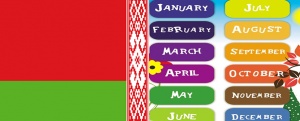Difference between revisions of "Language/Belarusian/Vocabulary/Months-of-the-Year"
< Language | Belarusian | Vocabulary
Jump to navigation
Jump to search
m (Vincent moved page Language/Byelorussian/Vocabulary/Months-of-the-Year to Language/Belarusian/Vocabulary/Months-of-the-Year) |
m (Quick edit) |
||
| (9 intermediate revisions by 3 users not shown) | |||
| Line 1: | Line 1: | ||
[[File:months-byelorussian.jpg|thumb | [[File:months-byelorussian.jpg|thumb]] | ||
Вітаю, Belarusian learners! 😃 | |||
In | In today's lesson, we are going to explore the Belarusian vocabulary for the months of the year. As you progress in your language journey, you might also find it helpful to learn other related topics. Feel free to check out our lessons on [[Language/Belarusian/Vocabulary/At-Home|Belarusian vocabulary for home]], [[Language/Belarusian/Vocabulary/At-the-Post-Office-Send-Letters|Belarusian phrases for the post office]], and [[Language/Belarusian/Vocabulary/Colors|Belarusian colors]]. | ||
Remember, you can always contribute to this wiki page if you think it can be improved. Enjoy your learning journey! 😊 | |||
__TOC__ | |||
==Vocabulary == | |||
{| class="wikitable sortable" | |||
!Беларуская | |||
!Translation | |||
|- | |||
|сту́дзень | |||
|January | |||
|- | |||
|лю́ты | |||
|February | |||
|- | |||
|сакавíк | |||
|March | |||
|- | |||
|красавíк | |||
|April | |||
|- | |||
|мáй (archaic: трáвень) | |||
|May | |||
|- | |||
|чэ́рвень | |||
|June | |||
|- | |||
| лíпень | |||
|July | |||
|- | |||
|жнíвень | |||
|August | |||
|- | |||
| вéрасень | |||
|September | |||
|- | |||
|кастры́чнік | |||
|October | |||
|- | |||
|лістапáд | |||
| November | |||
|- | |||
| снéжань | |||
|December | |||
|} | |||
=== | ==Examples == | ||
''Люты'' халодны і сухі – ''жнівень'' гарачы. (If February is cold and dry, August will be hot.) | {| style="border:2px #afeeee; border-style: dotted; border-width: 20px; padding: 10px; " | ||
| <span style="color:#009000"> ''Студзень'' халодны - ''ліпень'' будзе сухі і гарачы. </span>(If January is cold, July will be dry and hot.) | |||
|- | |||
|<span style="color:#009000"> ''Люты'' халодны і сухі – ''жнівень'' гарачы. </span>(If February is cold and dry, August will be hot.) | |||
|- | |||
|<span style="color:#009000"> Калі ў ''сакавіку'' вада не цячэ, то ў ''красавіку'' трава не расце. </span>(If water doesn't flow in March, grass won't grow in April.) | |||
|- | |||
|<span style="color:#009000"> ''Май'' халодны - не будзеш галодны. </span>(If May is cold, you won't be hungry.) | |||
|- | |||
|<span style="color:#009000"> ''Чэрвень'' - пачатак лета.</span> (June is the beginning of summer.) | |||
|- | |||
|<span style="color:#009000"> У ''верасні'' адна ягада, дый то горкая рабіна.</span> (There is one species of berries in September, and it's bitter rowan.) | |||
|- | |||
|<span style="color:#009000"> ''Кастрычнік'' ні калёс, ні палоз не любіць. </span>(October likes neither wheels, nor sleigh runners.) | |||
|- | |||
|<span style="color:#009000"> ''Лістапад'' зіме сцежку пракладае. </span>(November paves the path for winter.) | |||
|- | |||
|<span style="color:#009000"> Сухі ''снежань'' - сухая вясна. </span> (If December is dry, spring will be dry.) | |||
|} | |||
==Other Lessons== | |||
* [[Language/Belarusian/Vocabulary/Numbers|Numbers]] | |||
* [[Language/Belarusian/Vocabulary/Seasons|Seasons]] | |||
* [[Language/Belarusian/Vocabulary/At-the-Post-Office-Send-Letters|At the Post Office Send Letters]] | |||
* [[Language/Belarusian/Vocabulary/Count-from-1-to-10|Count from 1 to 10]] | |||
* [[Language/Belarusian/Vocabulary/City|City]] | |||
* [[Language/Belarusian/Vocabulary/Count-to-10|Count to 10]] | |||
* [[Language/Belarusian/Vocabulary/Food|Food]] | |||
* [[Language/Belarusian/Vocabulary/Body-and-Medecine|Body and Medecine]] | |||
* [[Language/Belarusian/Vocabulary/Animals|Animals]] | |||
* [[Language/Belarusian/Vocabulary/Vegetables|Vegetables]] | |||
<span links></span> | |||
Latest revision as of 13:30, 25 March 2023
Вітаю, Belarusian learners! 😃
In today's lesson, we are going to explore the Belarusian vocabulary for the months of the year. As you progress in your language journey, you might also find it helpful to learn other related topics. Feel free to check out our lessons on Belarusian vocabulary for home, Belarusian phrases for the post office, and Belarusian colors.
Remember, you can always contribute to this wiki page if you think it can be improved. Enjoy your learning journey! 😊
Vocabulary[edit | edit source]
| Беларуская | Translation |
|---|---|
| сту́дзень | January |
| лю́ты | February |
| сакавíк | March |
| красавíк | April |
| мáй (archaic: трáвень) | May |
| чэ́рвень | June |
| лíпень | July |
| жнíвень | August |
| вéрасень | September |
| кастры́чнік | October |
| лістапáд | November |
| снéжань | December |
Examples[edit | edit source]
| Студзень халодны - ліпень будзе сухі і гарачы. (If January is cold, July will be dry and hot.) |
| Люты халодны і сухі – жнівень гарачы. (If February is cold and dry, August will be hot.) |
| Калі ў сакавіку вада не цячэ, то ў красавіку трава не расце. (If water doesn't flow in March, grass won't grow in April.) |
| Май халодны - не будзеш галодны. (If May is cold, you won't be hungry.) |
| Чэрвень - пачатак лета. (June is the beginning of summer.) |
| У верасні адна ягада, дый то горкая рабіна. (There is one species of berries in September, and it's bitter rowan.) |
| Кастрычнік ні калёс, ні палоз не любіць. (October likes neither wheels, nor sleigh runners.) |
| Лістапад зіме сцежку пракладае. (November paves the path for winter.) |
| Сухі снежань - сухая вясна. (If December is dry, spring will be dry.) |
Other Lessons[edit | edit source]
- Numbers
- Seasons
- At the Post Office Send Letters
- Count from 1 to 10
- City
- Count to 10
- Food
- Body and Medecine
- Animals
- Vegetables
